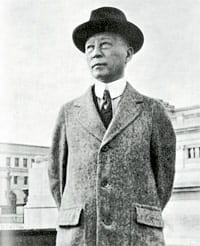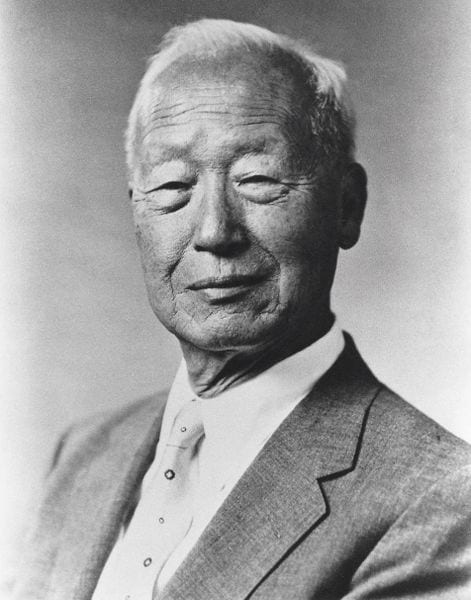
George Washington University (GW) was created by an Act of Congress in 1821. The University grew out of President George Washington’s desire to establish a national institution of higher learning. Today, GW is the largest institution of higher learning in the capital of the United States. We have more than 26,000 students—from all 50 states, Washington, DC, and 130 countries—studying in a wide range of disciplines. The university offers comprehensive undergraduate and graduate liberal arts education as well as degree programs in medicine, public health, law, engineering, education, business, professional studies, and international affairs.
Located in the heart of Washington, D.C., GW’s interest and strength in Asian studies are well known. GW’s Sigur Center for Asian Studies with more than 70 affiliated faculty members coordinates the largest Asian studies program in the Washington, D.C. metropolitan area. It enjoys a national and international reputation for its educational program and the quality of its academic and policy research. The Sigur Center’s outreach efforts to the general public are both extensive and significant.
GW is one of the institutions of higher learning that decided to strengthen its East Asian studies programs by formally including the Korean studies component in the early 1980s. In fact, GW’s relationship with Korea is long and substantial. Soh Jaipil (also known by different romanizations such as Seo Jae-pil and Sŏ Chaep’il, and by his American name of Philip Jaisohn), a renowned leader in the fight for independence and modernization of Korea, graduated from Columbia Medical College (now GW’s School of Medicine and Health Sciences) in 1892, becoming the first Korean and one of the first Asians to earn a Doctor of Medicine degree in the United States.
Syngman Rhee, the first President of the Republic of Korea (ROK), received his B.A. degree from GW in 1907, a Distinguished Alumni Achievement Award in 1949, and an honorary degree (LL.D.) in 1954. Roh Tae Woo, the 13th President of the Republic of Korea (1988-1993), received an honorary degree in 1989. Finally, on June 17, 2009, GW presented Lee Myung-bak, the 17th President of the Republic of Korea (2008-2013), with an honorary Doctor of Public Service degree.
Executives of the largest Korean companies, such as Hyundai, Dae Woo, Kolon, and Samsung either studied at GW, earned degrees, or were recipients of honorary degrees. President Lee Myung-bak spent nearly two years as a visiting scholar at GW’s Business School. In 2011, GW’s third Global Forum, following Hong Kong and New York, was held at the Grand Hyatt Seoul, bringing together GW alumni and friends of the university from 18 countries, including General Colin Powell, to discuss global issues related to growth and innovation.
Korea is home to GW’s largest and oldest international alumni chapter with more than 1,000 alumni. In addition to Syngman Rhee, GW awarded Distinguished Alumni Achievement Awards to five other Korean alumni:
1997 Nakyun Shin (Graduate School of Education and Human Development, MS ’84, EdS ’91), member of the ROK National Assembly
2004 Jung-Sook Kim (Graduate School of Education and Human Development, EdS ’88), member of the ROK National Assembly
2008 Julie S. Lee (School of Engineering and Applied Science, MS ’05), president and chief executive officer of Access Systems, Inc.

2012 Simon Lee (School of Engineering and Applied Science, MS ’05), founder and chief executive officer of STG Inc.
2015 Dae-Whan Chang (Elliott School of International Affairs, M.A. ’76), chair and publisher of the South Korea-based Maekyung Media Group
In 2014, Simon Lee, founder and chief executive officer of STG Inc., was awarded the George Washington University President’s Medal, the highest honor the university president can award.
Some GW professors and administrators, including former Presidents Steven Knapp and Stephen Joel Trachtenberg, have gone to Korea upon official invitations or as individual speakers to participate in various international conferences. President Steven Knapp traveled to South Korea in 2008 to witness ROK President Lee Myung-bak’s inauguration and made his third trip to Korea when he attended the third Global Forum in 2012. The Dean of GW’s Elliott School of International Affairs gave a keynote address in September 2016 at the World Knowledge Forum in Seoul.
More than 1,000 GW alumni—the largest concentration of GW alumni outside of the United States—reside in the Republic of Korea. Over thirty faculty members are of Korean origin, and GW hosts a large number of visiting scholars from Korea. Many business, political, social, and educational leaders in Korean society are GW graduates. The GW community has been greatly enriched by its relationship with Korea and Korea specialists. Being in the center of the nation’s capital, where many different nationalities come together, GW has constantly emphasized international and cross-cultural education.
GW has one of the oldest international studies programs in the country, having been engaged in instruction in international affairs since 1898. But the quality of our program has grown most rapidly since the establishment of a separate school of international affairs in 1987. Three times since the early 1990s, GW was awarded the status of a National Resource Center for International Studies by the U.S. Department of Education in its triennial competition, receiving a full range of funding for both academic programs and graduate fellowships. Each time, GW was the only university in the Washington area to receive such a grant and among less than a dozen awarded across the entire country.
GW also won, for the first time, Foreign Language and Area Studies (FLAS) awards in East Asian Studies. FLAS fellowships are awarded by the U S Department of Education to the best programs in area studies after a rigorous national competition. Until recently GW was the only university in the Washington area to offer FLAS fellowships for the study of East Asian languages and area studies. Other opportunities for domestic and study abroad language and culture study exist, including the Sejong Scholarship for Korean language studies in the Department of East Asian Languages and Literatures (EALL), Sigur Center Grant for Korean Language Study in Korea, Dorothy M. And Maurice C. Shapiro Traveling Scholarship, Boren Fellowships, Benjamin A. Gilman International Scholarship, Critical Language Scholarship, US Department of State Critical Language Scholarship, and Kathryn Davis Fellows for Peace. The Department of EALL also has a Korean Language and Culture Prize, which is given to the writer of the best essay in Korean studies.
The Korean and East Asian programs maintain close relations with the Freer-Sackler Galleries and the Asian Pacific American Program of the Smithsonian Institution, the world’s largest museum complex, which are minutes away from the GW campus. We work closely also with the area’s various research libraries and the Asian Division of the Library of Congress as well as with the East-Asian studies faculty in other universities in the area. Various embassies from East Asian countries including Korea and their cultural centers are frequent supporters of our academic and cultural activities. Curators, visiting faculty, and advanced graduate students from all over the world who do research at those institutions could be and are invited to help with guest teaching here at GW.
The Washington, D.C., metropolitan area is one of the most culturally diverse in the nation and one of the world’s most cosmopolitan urban areas. Maryland and Northern Virginia have a large and growing population of people of Asian ancestry, including a very significant number of ethnic Koreans, Chinese, Indians, and Vietnamese. The rapid growth of these Asian ethnic populations is increasingly reflected in GW’s enrollment figures. GW, like few other educational institutions of higher learning in the United States, is strategically situated geographically and demographically to further the research and teaching of East Asian societies and cultures as well as their current affairs.
The Korean studies program responds to the needs of the larger Washington, D.C. community. The Korean Language and Culture program has organized major academic and cultural events both for the Korean studies field and the larger community beyond GW since 1986. In 1995, the Hahn Moo-Sook Colloquium in the Korean Humanities series was inaugurated with a gift from the Hahn Moo-Sook Foundation in Korea. The colloquium has now become one of the longest-lasting academic outreach programs at GW. It is a popular and distinguished event in a city where most Korea-related meetings focus on social science approaches to political and economic issues. The HMS Colloquium has gained a national and international reputation as a significant forum to promote a better understanding of Korean history, culture, and society. We foster interdisciplinary and intercultural dialogue through discussions of matters that concern Koreans and the larger world around them. Our audience reflects the highly educated general public of the Washington, D.C., metropolitan area as well as our own university faculty and students.
In 2013, GW’s Department of EALL launched an East Asian Humanities Lecture series, with the inaugural lecture by S. Robert Ramsey of the University of Maryland, entitled “The languages of East Asia: What does it mean to be East Asian?” Four or five speakers a year are invited to deliver lectures on topics related to East Asian cultures and civilizations, encouraging dialogue among different subparts of this significant cultural entity. This recent initiative, which was initially supported by the Dean of the Columbian College of Arts and Sciences (CCAS) has become a permanent program of the EALL Department supported by an endowment established with a recent donation by Young-Key Kim-Renaud and Bertrand Renaud. The title has now changed to Kim-Renaud East Asian Humanities Lecture Series.
GW scholars draw on the massive holdings of the Library of Congress and National Archives as well as a number of academic, governmental and private institutional collections. GW is home to the Slavic, East European and Asian Reading Room, a special collection of reference works and periodicals unequaled in other academic institutions in the area, and to the National Security Archive, the world’s largest private repository of declassified government documents.
GW’s Asian studies program is especially strong in the areas of social sciences. This is also true of Korean studies. We have other excellent faculty members in history, political science, anthropology, business, economics, professional schools, and education fields. Situated very close to the White House and the State Department, GW has built up an excellent reputation as the best school to study political science.
We also have an exceptionally strong group of faculty members in the humanities fields, particularly in the Department of EALL. Until very recently GW was the only university in the Washington, D.C. metropolitan area, which offered a Korean Language and Literature minor. Furthermore, the Korean Language and Literature program at GW is in the context of a very strong East Asian Studies program and is an integral part of the Sigur Center for Asian Studies of the Elliott School of International Affairs, which provides financial support in teaching and researching about Korea as well as other nations in Asia.
(Source: Young-Key Kim-Renaud’s Report 2015)

